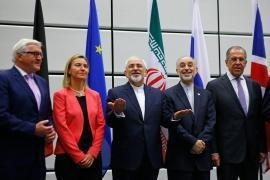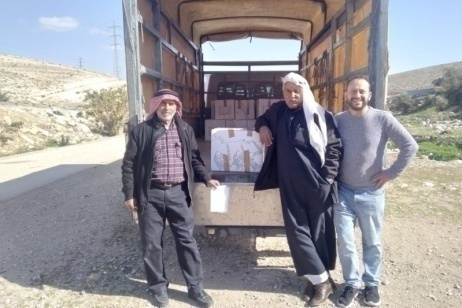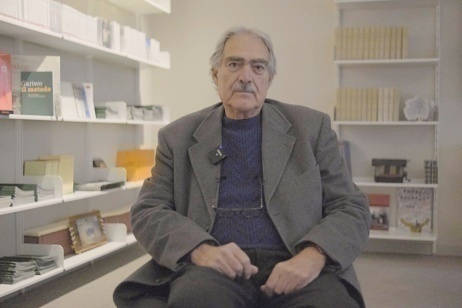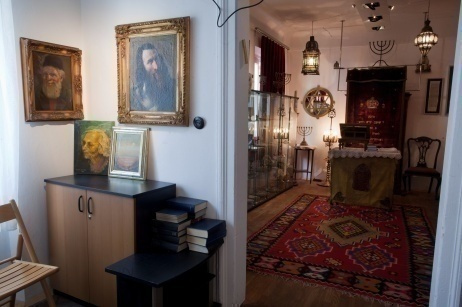
The diplomatic representatives in Vienna
After over twenty months of negotiations, Iran and the great powers have reached a deal about the Iran nukes. An important agreement, which will surely have a major impact on regional balances, the fight against international terror, the relations between Tehran and Washington and on the Iranian economy.
We talked about it with Antonio Ferrari, Corriere della Sera editorialist.
After long negotiations a deal was reached about the Iran nukes. What are the key points of the deal? Is there a true winner in these negotiations?
In a true negotiation there are no winners, but rather a principle or a new situation is stated. And this is what happened here. In change for the lifting of all sanctions that were putting the Islamic Republic on its knees, the West obtained the freezing of the whole nuclear programme of Iran for at least ten years, with a clause granting freedom for international inspectors to check the country’s military sites.
The end of sanctions has an extraordinary meaning, especially at a moment in which the world is confronting more and more serious security risks. The historic meaning of this agreement is that Iran is no more the outward point of the so called Axis of Evil, and it is important that Iran is no more an enemy.
Obama can certainly claim his victory, but he cannot avoid taking into consideration that this deal runs the risk of prompting very serious reactions on the side of America’s two most important allies in the region: Israel and Saudi Arabia.
Talking precisely about Israel, in Jerusalem the deal was called a “historic error” and a surrender of the West to the evil powers”…
Let’s not forget that Israel sees Iran as the worst danger for its security. In facts, thinking of an Iran equipped with nuclear weapons, given the ancestral hatred of the Islamic republic against the Jewish state, it could be partly right…
Nonetheless I believe that, despite the agreement that has been signed, the alliance with the Americans is not put into discussion, and on the contrary it will be the US to make everything in its power to prevent problems from affecting its long-term ally in the region – precisely Israel. Furthermore it needs be added that the world today is “transparent”, in other words it is impossible to hide uranium enrichment operations very easily, and therefore I think that this agreement – strongly sought not only by the Americans but also by the other members of 5+1, i.e. Russia, China, Great Britain, France and Germany, is absolutely verifiable point by point.
What are, instead, the implications of the deal on the Middle Eastern stage?
Iran’s allies in the region are Syria, led by a Shi’a minority whose chief is President Assad, Lebanon, with a Shi’a relative majority, in which Hezbollahs fight with Assad against the Islamic State, and Yemen, where a deadly clash is unfolding between the Sunni and the Shi’a element.
The Middle East has a sound Sunni majority, mostly made of moderates like Jordan, Palestine, the very Saudi Arabia, the Emirates. Then though there is an extremist element, which is redrawing the borders and maybe eliminating some certainties within the different State entities of the Middle East. For example, we do not know yet how much of the Syrian and Iraqi territory is in the hands of the Islamic state …
Eventually there is Saudi Arabia, the core of the Sunni world, which views the nuclear deal as a favour done to its sworn enemy, the great Iranian Shi’a power. Let us not forget that the two elements clashed violently during the war between Khomeini’s Iran and Saddam Hussein’s Iraq, and let us also talk about what is happening now, because Iran is in the first row in the fight against the Isis of al Baghdadi.
This is why the deal that has just been signed might have consequences both on the strategic level and on the political one, following the path of the various alliances that could somehow undergo changes because of this decision.
Following the deal, how will the US-Iran relations change?
Today we see two countries that could not bear each other anymore, and were instead dominated by hostile propaganda one against the other, who open a new chapter, maybe a phasis of nornalization of a situation that was becoming extremely heavy. Here again we meet with the Middle Eastern series of changes in relations and balances.
A lot of things unfolded between the United States and Iran over the years. The US relations with Iran were very important when the latter was ruled by the Shah, afterwards many said the Islamic revolution was in fact favoured by President Jimmy Carter himself, because during the Pahlavi regime there was no particular respect for human rights, and maybe Caster envisaged Khomeini as a pleasant alternative. Khomeini was then exiled in Paris and was “raised” by a part of the European intelligentsia. Then the situation went out of control, and those who thought the ayatollah was the panacea that could solve all problems and evils of Iran had to change their mind faced with the transformation of the country into a country that is in many ways liberticidal.
Carter paid for this – other than with the hostage seizure crisis started in November 1979 – with the Presidential seat, which would be held by Ronald Reagan.
I also remember the out break of the war between Iran and Iraq, with the support to Baghdad in terms of weapons and intelligence from all Sunni monarchies, but also from Washington. Another series, this time of improvement signals, that went on with Katami’s presidential term. Then there was a radical worsening of relations with the US under Ahmadinejad, until the appointment of Rohani, less of a philosopher and a visionary than Khatami, but a man of his time who is able to support and complete the negotiation of the nuclear deal.
How was the deal welcome in Iran?
Sanctions were literally strangling a country of about 80 million inhabitants. An important country, an oil producer that today, favoured by this deal, might get back onto the market. This is why the deal was welcome enthusiastically, because it is the end of a nightmare that has involved more generations of Iranians.
Of course, we will have to see if all requirements are met, but for Iran this means reaching a relatively quiet situation on the markets, restarting having foreign visitors, in one word getting back to the normal life of an important and refined state such as Iran.
Thus enthusiasm is there and it is even catchy, concerning what can be really be considered as a historic turning point.





